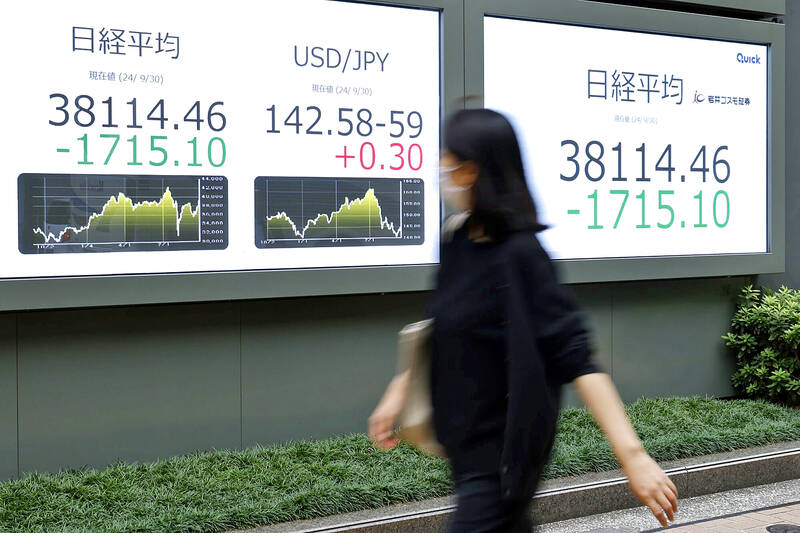Shares in Hong Kong and China rocketed yesterday, extending last week’s surge after Chinese authorities unveiled a raft of measures aimed at propelling the world’s No. 2 economy.
However, Tokyo plunged as much as 5 percent in reaction to Shigeru Ishiba’s election last week as the head of Japan’s ruling Liberal Democratic Party, which boosted expectations that the Bank of Japan would continue hiking interest rates.
Shanghai jumped more than 8 percent — its best day since 2008 — and Shenzhen more than 10 percent, while Hong Kong briefly leaped around 4 percent.

Photo: Bloomberg
Investors have been rushing back into the beaten-down markets in reaction to a series of economy-boosting stimulus out of Beijing over the past week.
Among the measures unveiled were interest rate cuts, easing how much banks must keep in reserve and softer rules on buying homes.
Yesterday, three megacities — Shanghai, Guangzhou and Shenzhen — eased restrictions on buying homes, while six of China’s biggest banks said they would tweak interest rates on mortgages for existing home loans following a request to lower them from the central bank.
The rally — which has seen Shanghai rise more than 20 percent in the past six trading days — comes a day before Chinese markets are closed for the Golden Week holiday.
Moody’s Analytics economist Harry Murphy Cruise said the moves “signal growing unease about the health of China’s economy.”
“That officials brought forward economic discussions to this week’s politburo meeting — rather than sticking to the December schedule — highlights the urgency of the problem,” Cruise said.
The need for stimulus support was highlighted yesterday by data showing China’s factory activity shrank last month for the fifth successive month.
Still, XTB research director Kathleen Brooks said that “the market is not focused on this data, as it is measuring activity before the massive stimulus package, instead, October’s data will matter more for markets.”
The euphoria in China and Hong Kong was in stark contrast to Tokyo, where the Nikkei 225 index plunged as the yen strengthened in the wake of Ishiba’s victory.
Ishiba is expected to maintain many of his predecessor Japanese Prime Minister Fumio Kishida’s policies, but he has also said that “there is room for raising the corporate tax,” while promising to revitalize rural regions.
“Our view is that the basic economic policy philosophy will not change,” UBS Securities Japan Co chief economist Masamichi Adachi said.
Exporters were the big losers as the yen spiked to 141.65 per US dollar in reaction to Ishiba’s win, which observers said would mean the central bank would likely press on with its monetary tightening campaign. The unit had been sitting around 146.50 before Friday’s vote.
Markets were mixed elsewhere in Asia. Taiwanese shares ended down 2.62 percent, and markets in Seoul, Wellington, Mumbai, Manila and Jakarta were also in the red, while Sydney, Bangkok and Singapore rose.
European shares moved lower yesterday. London fell as data showed the UK economy grew less than initially estimated in the second quarter, with Paris and Frankfurt also down.

CHIP RACE: Three years of overbroad export controls drove foreign competitors to pursue their own AI chips, and ‘cost US taxpayers billions of dollars,’ Nvidia said China has figured out the US strategy for allowing it to buy Nvidia Corp’s H200s and is rejecting the artificial intelligence (AI) chip in favor of domestically developed semiconductors, White House AI adviser David Sacks said, citing news reports. US President Donald Trump on Monday said that he would allow shipments of Nvidia’s H200 chips to China, part of an administration effort backed by Sacks to challenge Chinese tech champions such as Huawei Technologies Co (華為) by bringing US competition to their home market. On Friday, Sacks signaled that he was uncertain about whether that approach would work. “They’re rejecting our chips,” Sacks

It is challenging to build infrastructure in much of Europe. Constrained budgets and polarized politics tend to undermine long-term projects, forcing officials to react to emergencies rather than plan for the future. Not in Austria. Today, the country is to officially open its Koralmbahn tunnel, the 5.9 billion euro (US$6.9 billion) centerpiece of a groundbreaking new railway that will eventually run from Poland’s Baltic coast to the Adriatic Sea, transforming travel within Austria and positioning the Alpine nation at the forefront of logistics in Europe. “It is Austria’s biggest socio-economic experiment in over a century,” said Eric Kirschner, an economist at Graz-based Joanneum

BUBBLE? Only a handful of companies are seeing rapid revenue growth and higher valuations, and it is not enough to call the AI trend a transformation, an analyst said Artificial intelligence (AI) is entering a more challenging phase next year as companies move beyond experimentation and begin demanding clear financial returns from a technology that has delivered big gains to only a small group of early adopters, PricewaterhouseCoopers (PwC) Taiwan said yesterday. Most organizations have been able to justify AI investments through cost recovery or modest efficiency gains, but few have achieved meaningful revenue growth or long-term competitive advantage, the consultancy said in its 2026 AI Business Predictions report. This growing performance gap is forcing executives to reconsider how AI is deployed across their organizations, it said. “Many companies

France is developing domestic production of electric vehicle (EV) batteries with an eye on industrial independence, but Asian experts are proving key in launching operations. In the Verkor factory outside the northern city of Dunkirk, which was inaugurated on Thursday, foreign specialists, notably from South Korea and Malaysia, are training the local staff. Verkor is the third battery gigafactory to open in northern France in a region that has become known as “Battery Valley.” At the Automotive Energy Supply Corp (AESC) factory near the city of Douai, where production has been under way for several months, Chinese engineers and technicians supervise French recruits. “They